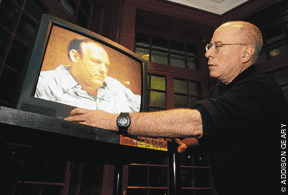How to Succeed in Hollywood By Really Trying
FADE IN:
INTERIOR KELLY WRITERS HOUSE—NIGHT.
A packed audience stares intently at a television set on a wheeled metal stand at the front of the room. On the screen a nighttime shot of a glittering city skyline gives way to a gritty urban street scene as the camera pans down to follow a young woman —the actress Rosie Perez, quickly established as a crack-addicted prostitute—who buys drugs and, in the dark, narrow stairwell of a crack house, is brutally robbed, her face slashed when she tries to resist. As she crumples to the floor, and a crack-dealer, coming upon her body, steps over it to flee the scene, the film’s title appears:
Criminal Justice
Written and Directed by
Andy Wolk
CUT TO:
A stocky, fifty-something man standing at the podium next to the television stand. He steps over to the set and pauses the videotape.
MAN:OK—now how would you handle that scene?
The man is Andy Wolk C’70, whose credits (besides the above film, which aired on HBO and was named the best cable movie of the year) include Deliberate Intent and A Town Without Christmas, as well as directing assignments for such television series as NYPD Blue, The Practice,and The Sopranos. As members of his audience offer abstract and general responses, he finally demands, with a kind of genial impatience: “Where are you going to put the camera? It’s a big thing; you have to put it somewhere.”

It’s not that Wolk is caught up in film technique, but that he wants to emphasize the importance of communicating “the truth of the scene” in concrete, specific terms. The question, he says, is, “What do you want to see?” As a director, “You really need to train yourself to see.”
Wolk visited Writers House in late January for a three-day symposium that included two public presentations on working in film and the “nuts-and-bolts” of screenwriting, plus one-on-one sessions with five Penn-affiliated writers whose work was chosen by Writers House staff from among 20-30 submitted scripts. The visit, he said, came out of his desire to “give something back to Penn—a karmic thing.”
Writers House Faculty Director and Kelly Family Professor of English Al Filreis called Wolk a “great friend to Penn’s emerging writers,” and said that his symposium “confirmed my already strong sense that at the Writers House we can show young writers that writing is a practice.”
Before devoting himself to screenwriting and, more recently, film and TV directing, Wolk worked as a theater director and playwright in Europe and the U.S., including the LaMama Theater off-Broadway, Lincoln Center (where he directed two Shakespeare plays), and the Manhattan Theater Club. That experience saved him from a fear common among film directors: “Many [of them] are afraid of actors,” he said. While stage actors must “possess” a play, in film “it only has to happen once, and you have to have film in the camera.”
The individual sessions with the aspiring screenwriters were modeled on workshops Wolk has led at the Sundance Labs, connected with the famed independent-film festival. To determine the “nature of what you want as a writer and how to maximize that,” he explained, the meetings would address two questions: “How can we make this [script] into something good? And how to use this as a way of learning what is good?”
The Sundance Labs (whose unofficial motto is: “It hurts so good”) stands in marked contrast to workaday Hollywood, where “people are prepared to step on their own mother to succeed.” For those not willing to go that far, Wolk recommended working harder than the competition as the best way to join the “small fraternity of people who write for film and television.”
Screenwriting is a hard discipline, requiring “rigor and ruthlessness,” Wolk said. “If you can write a good script, the world will beat a path to your door.” It helps if your door is somewhere in southern California, he added.
At Wolk’s prompting, the aspiring screenwriters talked a little about themselves and their work:
• College student Roopika Risam submitted a play about “a screwed-up family with different obsessions” in which the main character, an Indian girl, wants to be the singer Karen Carpenter.
• Timothy Yue C’02 listed among the elements in his opus: “a career woman searching for her child and the family life she never had. And a detective. And a serial killer.”
• First-year law student Matt Rittberg (who learned he’d been accepted to Penn while in L.A. trying to break into the film business) sent in an “outrageous” romantic comedy—“Guy meets, loses, gets girl”—built around the girlfriend of a young editor at a Maxim-style magazine discovering that he has slept with a starlet.
• Laura Meehan, an employee in the Health System and an English major in the College of General Studies, was working on the tale of an impoverished, elderly woman who schemes to have herself arrested and jailed in a special prison for senior citizens.
• John Primerano, a student in the College, whose script was a comedy about two rival ice-cream store chains, one of which adopts a slacker’s “badass attitude” in order to control the youth market.
Wolk said that each script, though flawed, contained something fresh and original—though he later remarked that often the students didn’t realize when they were doing something good. (“The real script,” he said, “is the one they’re avoiding.”) He also noted that he found himself writing CONFLICT in big letters in the margins of the scripts. “People were talking, restating plot, meandering about as opposed to [being in] collision,” he said.
In Wolk’s view of filmmaking, the setup—the opening scene that establishes the character’s world, which the ensuing story will turn upside down—is critical, providing the kind of whack! needed to start the movie. “Five minutes before the movie begins,” he explained, “the central character doesn’t know what’s going to befall him.”
Criminal Justice—which asks whether the prostitute will be able to get justice against her assailant—follows the model. So does the very different Kramer vs. Kramer, which a much-younger Wolk watched over and over again in a movie theater. Sitting on the floor so that he could use the running lights along the aisle to take notes, he made an outline of its structure, learning how it worked. (“You see how insane, driven, obsessed I was,” he said.) At night, he would write until three a.m., and then worry that there was “somebody else out there, and he’s staying up till four,” he added. “You will not get by with a half-assed effort at the end of the day.”
A wolf at the door can be a powerful motivator for achieving success, he suggested. In describing a friend who practiced law but was disappointed that his career as a musical composer hadn’t taken off, Wolk speculated that having the law “to fall back on” was one source of his failure. His own attitude was, “I will do anything to succeed.”
Writers know when something isn’t working, he said, but even veterans can convince themselves otherwise. He recalled a meeting with studio executives about a script he had written in which, for reasons necessary to the plot, the hero performed an action that was out of character. Wolk and his co-writer had struggled with it, but never licked the problem. Nevertheless, the meeting seemed to go well, and Wolk left feeling optimistic. Moments later, when his agent called him on his carphone, Wolk began to share the good news, only to be told that the script had already been rejected. “If there’s one part of it that isn’t working, it isn’t working,” he says. “If you know it, so will others.”
In the individual sessions, besides critiquing the scripts, Wolk gave the participants tasks to perform and problems to solve —such as coming up with a better device than a lost wallet to have the editor’s girlfriend find out about the starlet, figuring out five ways to get the old woman to visit the prison before she decides she wants to become an inmate, and writing a scene that shows the Indian girl wanting to be Karen Carpenter—and urged them to e-mail him with revisions and questions.
As of late March, most of them had—stressing how important the symposium was to them and giving him a “sense of their plans for the future.” While he expects that some writers will send him revisions, solving the problems of a specific script is not the most important lesson to be learned.
“It’s more getting an increased sense of what you can do as a writer now and in the future and what it means to be serious about writing a screenplay,” he says. “I think there’s a kind of sinking-in and inspiration that happens and grows. It’s probably more about writing in general.”
Looking back on the experience, one participant, Timothy Yue, says that, “Having spent several months working on a screenplay, it’s hard to hear that the main story is unoriginal, or certain parts are unbelievable” —though he adds that, “Even initially, I realized that Andy’s comments were dead on.”




